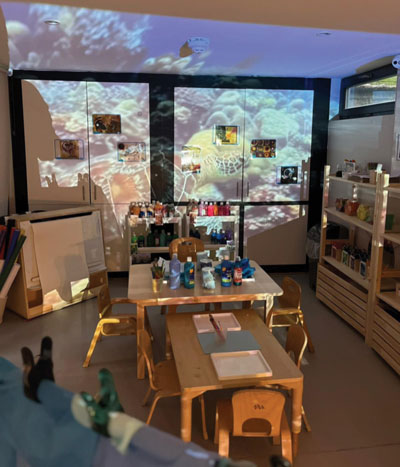
by Karen Borley
Senior Education Advisor, N Family Club
The magic of the atelier and self-expression in the Early Years
In their early years, children establish the foundations of how they view the world, relate to others and express themselves. One way to support this development is through the use of an atelier, which is a dedicated space for self-expression. Inspired by the Reggio Emilia approach to early childhood education, the atelier is a vibrant, ever-evolving environment where children of all ages can make sense of their world through art, play and sensory discovery.
The atelier concept comes from the Reggio Emilia approach, a renowned educational philosophy that places high value on children’s natural creativity. Reggio educators refer to the variety of ways that children interpret the world as the ‘hundred languages of children’ with the environment as the ‘third teacher’. Aligning with the Early Years Foundation Stage’s (EYFS) Expressive Arts and Design area, an atelier can facilitate the ‘hundred languages’ through 2D and 3D art, clay modelling, transient art, photography, music and sound, amongst other experiences. Children are free to experiment, to combine different mediums, to revisit ideas and to create without the pressure of a ‘right’ answer. Essentially, the journey matters as much as the end result.
When set up thoughtfully, as a dedicated room or as a part of the main family room, the atelier should invite exploration, curiosity and wonder in children of all ages. Experiences and materials can be adapted to suit a child’s stage of development – whether it’s a toddler squishing clay between their fingers or a preschooler constructing a 3D sculpture with the same materials, the atelier should welcome all forms of expression and creativity. For babies, an atelier experience might be about sensory exploration – watching light and shadow, listening to soft music or touching different textures. For toddlers, it could be about mark-making, experimenting with colour, or stacking and building. Older children may work on more complex projects involving design, sculpture and collaboration. Every child has the opportunity to develop confidence in their ideas, to try new techniques, and to build something uniquely theirs.
In the atelier, children can be introduced to a diverse range of artists whose work sparks curiosity and wonder. Artists such as Joan Miró, Jackson Pollock, Henry Moore and Yayoi Kusama can be explored. For example, a child might respond to Kusama’s dots with their own vibrant pattern work. These experiences help children see themselves as artists, too. They learn that art is not about perfection but about expression – finding their voice, rhythm and mark in the world.
The atelier is also a space for project work – an opportunity for deeper, shared discovery. Children can return to their creations over days or even weeks, adding layers of thought, materials and meaning. This ongoing process demonstrates to children that their ideas matter and deserve both time and attention. Educators should play a key role here, introducing new materials and techniques, asking thoughtful questions and helping children to connect their experiences to broader ideas. Older children can be provided with the opportunity to collaborate with one another by discussing plans and building together, and these early experiences of teamwork and communication lay strong foundations for emotional and social development.
An important aspect of the atelier approach is documentation. Children’s creations should not just be displayed, but also celebrated. Photos, notes and collections of work allow children to revisit past experiences, reflect on their process and share their stories with peers and their families, supporting a sense of ownership and pride. By giving children the freedom and tools to express themselves, we help nurture confident thinkers, communicators and lifelong learners. In the safe, inspiring space of the atelier, each child is invited to tell their story in their own unique way. For families, knowing that such a space exists in their child’s nursery can offer reassurance that their child is being seen, heard and valued every day.
Founded in 2017, N Family Club set out to rethink Early Years education – developing a progressive curriculum, building a sector-leading team culture, and a world class service that adds real value for families. A proud B Corp, N Family Club were rated the highest quality nursery group in the UK by Nursery World in 2022 & 2023 and were accredited as a Great Place to Work in 2024. www.nfamilyclub.com











